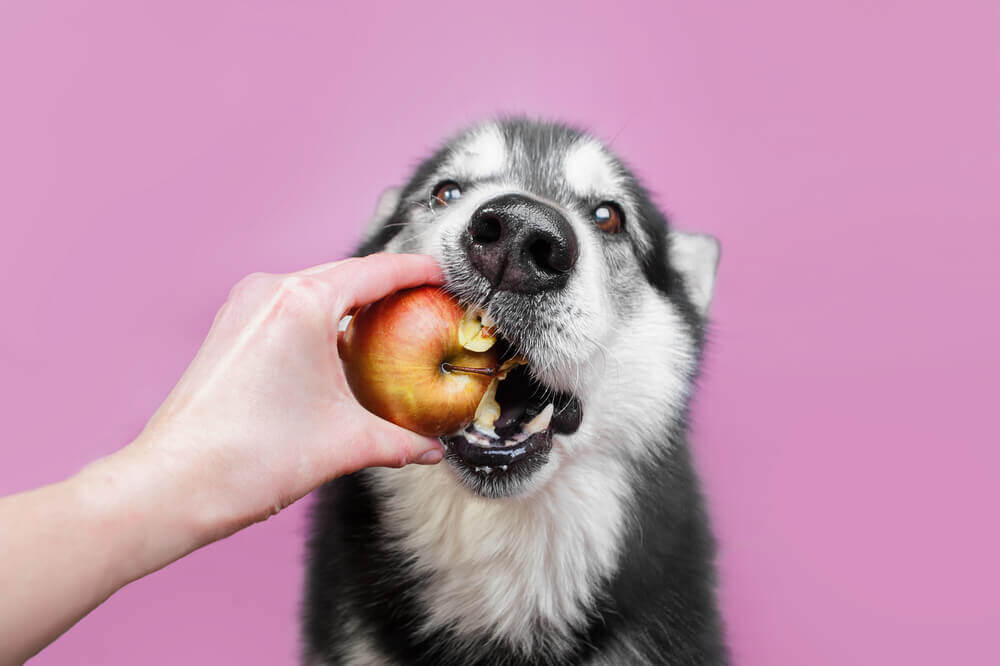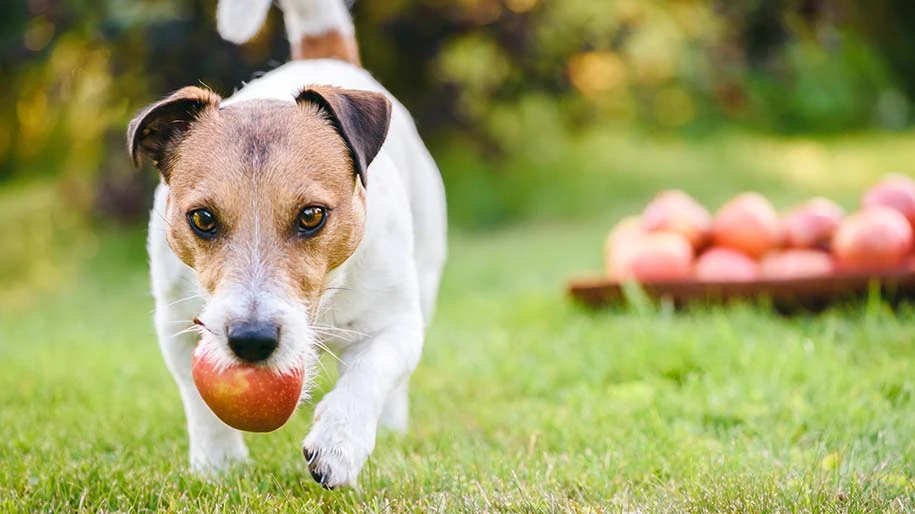Yes, apples are safe for dogs to eat in moderation. Remove the seeds and core before feeding them to your dog.
Apples can be a healthy treat for your canine companion. They are rich in vitamins A and C, and provide fiber. This fruit is a low-calorie snack that can support your dog's overall health. Be sure to wash the apple thoroughly and remove any seeds, as they contain cyanide, which is toxic to dogs.
The core can also be a choking hazard. Sliced apples make for an easy and convenient treat. Always introduce new foods gradually and monitor your dog for any adverse reactions. Including apples in your dog's diet can add variety and nutritional benefits.
Introduction To Apples For Dogs
Apples are a popular fruit among humans. They are sweet, crunchy, and nutritious. But are apples safe for dogs to eat? Many dog owners wonder if they can share this tasty treat with their furry friends. This section will explore the benefits and potential risks of feeding apples to your dog.
Benefits Of Apples
Apples offer several health benefits for dogs. Here are some key advantages:
- Rich in vitamins: Apples are high in vitamins A and C.
- Low in fat: They are an excellent low-fat snack.
- High in fiber: Apples help with your dog's digestion.
- Hydrating: They contain a lot of water, keeping your dog hydrated.
- Dental health: Chewing apples can clean your dog’s teeth.
Potential Risks
While apples have many benefits, there are also some risks to consider:
| Risk | Explanation |
|---|---|
| Choking hazard | Apple seeds and cores can be a choking risk. |
| Cyanide in seeds | Apple seeds contain cyanide, which is toxic to dogs. |
| Digestive upset | Too many apples can cause stomach issues. |
| High sugar content | Apples have sugar, which can lead to weight gain. |
To safely feed apples to your dog, follow these steps:
- Remove the seeds and core.
- Cut the apple into small, manageable pieces.
- Give apples in moderation to avoid stomach upset.

Credit: be.chewy.com
Nutritional Value Of Apples
Apples are a popular fruit that many people enjoy. But are they safe for dogs? Let's explore the nutritional value of apples to see if they are a good choice for your furry friend.
Vitamins And Minerals
Apples are packed with essential vitamins and minerals. These nutrients support your dog's overall health. Here are some key vitamins and minerals found in apples:
- Vitamin A: Supports vision and immune function.
- Vitamin C: Boosts the immune system.
- Potassium: Helps with muscle function and heart health.
- Calcium: Strengthens bones and teeth.
These vitamins and minerals can contribute to your dog's well-being. Ensuring they get these nutrients can help keep them healthy and happy.
Read More: Figs Nutritional Benefits
Fiber Content
Fiber is another important component of apples. It aids in digestion and promotes gut health. Apples contain both soluble and insoluble fiber. This combination can be beneficial for your dog's digestive system.
| Type of Fiber | Benefit |
|---|---|
| Soluble Fiber | Helps regulate blood sugar levels. |
| Insoluble Fiber | Promotes regular bowel movements. |
Including apples in your dog's diet can provide the fiber they need. This can help them maintain a healthy digestive system.
Health Benefits For Dogs
Apples are not just tasty for humans; they offer many health benefits for dogs too. Including apples in your dog's diet can improve their overall well-being. Here, we explore how apples can benefit your furry friend.
Improved Digestion
Apples are rich in dietary fiber, which helps improve digestion in dogs. Fiber aids in regular bowel movements, reducing the risk of constipation. A healthy digestive system means your dog can absorb nutrients better.
Here's a quick look at the fiber content in apples:
| Apple Variety | Fiber Content (per 100g) |
|---|---|
| Red Delicious | 2.3g |
| Granny Smith | 2.6g |
| Gala | 2.5g |
Including apples in your dog's diet can keep their gut healthy. Just be sure to feed them in moderation.
Enhanced Immune System
Apples are packed with vitamin C, which boosts your dog's immune system. A strong immune system helps your dog fight off infections and stay healthy. Apples also contain antioxidants that protect cells from damage.
Here are some key vitamins and minerals found in apples:
- Vitamin C - Boosts immunity
- Vitamin A - Promotes eye health
- Potassium - Supports heart function
Feeding your dog apples can help them stay active and healthy. Remember to remove seeds and cores before feeding.

Credit: whatthepup.spotandtango.com
Identifying Safe Apple Parts
Dogs love apples, but not all parts are safe. It's important to know which parts are edible and which are toxic. This section helps you keep your dog safe while enjoying apples.
Edible Parts
The flesh of the apple is safe for dogs. You can offer it in slices or small chunks. Always wash the apple before cutting it. This removes any pesticides or dirt.
- Apple flesh is rich in vitamins.
- It has dietary fiber, which helps digestion.
- Always serve in moderation to avoid upset stomach.
Toxic Parts
Some parts of the apple are harmful to dogs. Avoid giving these parts to your dog.
| Toxic Part | Reason |
|---|---|
| Seeds | Contain cyanide, which is toxic. |
| Core | Can cause choking or digestive issues. |
| Stem | Hard to digest and can be a choking hazard. |
Remove the seeds, core, and stem before giving apples to your dog. This ensures they enjoy the treat safely.
Preparing Apples For Dogs
Apples can be a healthy snack for dogs. It's important to prepare them correctly. This ensures your dog enjoys the fruit safely. Follow these steps for preparing apples for your furry friend.
Washing And Cleaning
Always wash apples before serving them to your dog. This removes pesticides and dirt. Use cold water and gently scrub the apple's surface. You can also use a fruit wash for extra cleaning.
Cutting And Serving
Cut the apple into bite-sized pieces. This makes it easier for your dog to eat. Ensure you remove the seeds and core. Apple seeds contain cyanide and are harmful to dogs. The core is tough and can be a choking hazard.
| Step | Action |
|---|---|
| 1 | Wash the apple thoroughly |
| 2 | Cut the apple into small pieces |
| 3 | Remove seeds and core |
Once the apple is ready, serve it in moderation. Too much apple can upset your dog's stomach. Start with a small amount to see how your dog reacts.
Apples can be a great treat for dogs. Just ensure they are clean and cut properly.
Portion Control
Feeding apples to your dog can be a delightful treat. But it's important to understand the right portion size. Overfeeding can lead to health problems. Here, we'll discuss the recommended serving size and frequency of feeding apples to your dog.
Recommended Serving Size
Apples are healthy, but they should be given in moderation. The recommended serving size depends on your dog's weight:
| Dog's Weight | Apple Serving Size |
|---|---|
| Small (up to 20 lbs) | 1-2 slices |
| Medium (20-50 lbs) | 2-3 slices |
| Large (over 50 lbs) | 3-4 slices |
Ensure the apple slices are small enough to prevent choking. Always remove the seeds and core before serving.
Frequency Of Feeding
While apples are nutritious, they should not be a daily treat. Limit apple treats to a few times a week. This helps maintain a balanced diet for your dog.
- Small dogs: 1-2 times a week
- Medium dogs: 2-3 times a week
- Large dogs: 3-4 times a week
Monitoring the frequency and portion size ensures that your dog enjoys apples safely and healthily.
Signs Of Apple Allergy
Apples are generally safe for dogs. Yet, some dogs might be allergic. It's important to recognize the signs of apple allergy in your furry friend. Early detection helps prevent serious health issues.
Symptoms To Watch For
If your dog is allergic to apples, certain symptoms may appear. Watch for these common signs of an allergy:
- Itching and scratching
- Red or inflamed skin
- Swelling around the face or paws
- Diarrhea or vomiting
- Excessive licking
- Difficulty breathing
Each dog may show different symptoms. Always monitor your pet closely after feeding new foods.
Immediate Actions
If you notice any signs of an allergy, take immediate action. Follow these steps to ensure your dog's safety:
- Stop feeding apples immediately.
- Check for severe symptoms like difficulty breathing.
- Provide fresh water to help flush out allergens.
- Contact your veterinarian for advice.
- Keep a record of the symptoms and their duration.
Quick response can prevent serious issues. Always consult your vet for the best care plan.
Consulting Your Veterinarian
Apples can be a tasty treat for dogs. But, it's essential to ensure they are safe. Consulting your veterinarian is a crucial step. Your vet knows your dog's health best. They can provide personalized advice.
Importance Of Professional Advice
Vets have expert knowledge about pet nutrition. They understand which foods are safe and which are not. Professional advice helps you avoid potential risks. Some dogs may have allergies or specific conditions. Vets can identify these issues.
Here are some reasons to consult your vet:
- Identify allergies or intolerances.
- Check for any existing health conditions.
- Get guidance on portion sizes.
- Ensure the apples are prepared safely.
When To Seek Help
Monitor your dog after they eat apples. If you notice any unusual symptoms, contact your vet. Here are some signs to watch out for:
| Symptom | Description |
|---|---|
| Vomiting | Your dog may throw up after eating apples. |
| Diarrhea | Loose stools might indicate an issue. |
| Itching | Scratching or biting could signal allergies. |
| Swelling | Look for swelling around the mouth or face. |
Seek immediate help if any of these symptoms occur. Early intervention can prevent serious issues.
Your vet can also guide you on safe apple preparation. Remove seeds and core to avoid choking hazards. Always serve apples in small, manageable pieces.
Alternatives To Apples
Apples are a popular treat for dogs, but what if your furry friend doesn't like them? Don't worry, there are many alternatives to apples that are both safe and healthy for dogs. Here, we'll explore some other fruits and snacks that your dog can enjoy.
Other Safe Fruits
Many fruits are safe for dogs and can be a healthy treat. Here are some options:
- Bananas: Great source of vitamins and potassium.
- Blueberries: Packed with antioxidants and fiber.
- Strawberries: Rich in vitamin C and fiber.
- Watermelon: Hydrating and low in calories.
Healthy Dog Snacks
If you want to give your dog something other than fruit, consider these healthy snacks:
| Snack | Benefits |
|---|---|
| Carrots | Low in calories, good for teeth. |
| Green Beans | Full of vitamins and fiber. |
| Pumpkin | Good for digestion and rich in nutrients. |
| Sweet Potatoes | High in vitamins and antioxidants. |
These snacks are not only tasty but also provide essential nutrients. Always make sure the snacks are cut into small pieces to avoid choking hazards.

Credit: www.metlifepetinsurance.com
Frequently Asked Questions
Are Apples Safe For Dogs To Eat?
Yes, apples are safe for dogs in moderation. They provide vitamins and fiber. Always remove seeds and core before feeding.
Can Dogs Eat Apple Seeds?
No, dogs should not eat apple seeds. They contain cyanide, which is toxic. Always remove seeds before giving apples to your dog.
How Much Apple Can I Give My Dog?
Give your dog apple slices as a treat. Moderation is key. Too much apple can cause digestive issues.
Are Apple Skins Safe For Dogs?
Yes, apple skins are safe for dogs. They contain fiber and nutrients. Wash thoroughly to remove pesticides before feeding.
Conclusion
Apples can be a healthy treat for dogs when given in moderation. Always remove seeds and core to ensure safety. Monitor your dog for any allergic reactions or digestive issues. Consult your vet before introducing new foods. Your furry friend can enjoy apples as part of a balanced diet.
